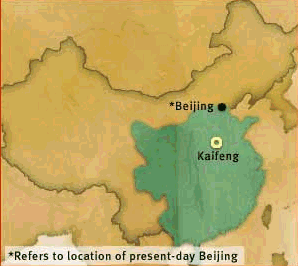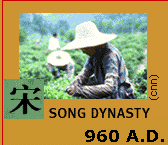 CNN's
Intro: The Song reunified China after nearly six decades of warfare. The Song
rulers reestablished a centralized bureaucracy for their nation. Private trade
grew, giving birth to the mercantile class.
CNN's
Intro: The Song reunified China after nearly six decades of warfare. The Song
rulers reestablished a centralized bureaucracy for their nation. Private trade
grew, giving birth to the mercantile class. CNN's
Intro: The Song reunified China after nearly six decades of warfare. The Song
rulers reestablished a centralized bureaucracy for their nation. Private trade
grew, giving birth to the mercantile class.
CNN's
Intro: The Song reunified China after nearly six decades of warfare. The Song
rulers reestablished a centralized bureaucracy for their nation. Private trade
grew, giving birth to the mercantile class.
It was a time of cultural refinements and new interest in Confucianism. Tea and cotton became major crops, and gunpowder was first used for military purposes. Despite that advance, the Song eventually fell to Mongol invaders.
 What stimulated the phenomenal growth of China during the Song times?
What stimulated the phenomenal growth of China during the Song times?
Shifting South: The Song Dynasty 907-1276
Chang'an and Luoyang sacked
200 years of independent regional armies
937 Kihtans, from Mongolia, found the Lio state in the area of modern Beijing.
The *Tanguts*, from Tibet, control the N.W. and founds the Xia state.
The Jurchens of Manchuria (N. of Khitan's Liao state) found the Jin dynasty
Taizu 960-76, commander of the palace army becomes the first emperor of the Song.
Political Control
How does Taizu control his army and the new country?
Military expenses take up 3/4 of national
budget.
Education -- new revised exam system -- candidates grow from 30,000 in 1100 to
80,000 in 1200 to 400,000 by 1300 -- but numbers of official posts do not
change!
Paper Money -- instead of silk -- government
takes over from 1120
Trading in SE Asia -- compass invented in 1119
Why would the traditional aristocracy decline during this period?
But what aristocratic advantages remain?
Wang Anshi 1100-26
Emperor Huizong cultivates the arts at the expense of everything else. 3000 members of his family get taken captive by the Jurchens. 1135 -- End of Northern Song.
Southern Song (1142) -- capital
at Hangzhou --
tribute payments to Jin
What were some of the effects on Chinese
"cultural integrity" of having the capital in the South?
on Buddhism?
on art?
on Confucianism?
Myths of women sent to the north as tribute
Neo-Confucianism -- a response to Buddhism
The Cheng brothers *theory of li and qi* (moral/physical/principle and energy/substance/action) Helps define Mencius's theory of human nature needing cultivation -- li is the outward appearance; while qi is the intent or motivation. All social reform, therefore, must start with the individual and the local level.
Printing and Publishing expand
*Zhu Xi* is the leading Neo-Confucian scholar, interested in moral exhortation virtue and scholarly exegesis or eruditeness
His work, a commentary on the four books (The Analects, Mencius, the Doctrine of the Mean, and The Great Learning) is finally accepted by the state three decades after he dies in 1241.
What do you think prompted this acceptance?
Local culture
Expansion of wet rice agriculture -- requires smaller land holdings and varied forms of land tenure
What are some of the benefits of wet culture rice?
Although Westerners like to define Asian culture in terms of the social organization required for growing rice, could you argue that this is not the case?
Impressions:
*Marco Polo's account*
Expanding Themes in Early Chinese History
Chinese Ethnic Dynamics or Contacts with Outside Peoples
Khitans;
Tanguts #32 "The Tanguts and their Relations with the Han Chinese";
Jurchen
Cosmology and Religion, or Religious Transformations
Song --Moral Tracs (#33 Book of Rewards and Punishments) blending Buddhist concepts of karma and retribution with Confucian/Taoist principles ; #34 Precepts of the Perfect Truth Daoist Sect, Neo Confucianism
Chinese Myth-history -- history writing and historical genre
Government -- Political Control and Expression
#35 "Wang Anshi, Sima Guang, and Emperor Shenzong
What were Wang Anshi and Sima Guang debating and what was the result?
#42 "The Mutual Responsibility System" by Zhen Dexiu (1178-1235), a local magistrate
What are some of the pros and cons to such a system?
Family, kinship and gender -- Confucian Ladies and Gentlemen
#36 "Rules for the Fan Lineage's Charitable Estate"
#37 "Ancestral Rites," by Zhu Xi (1130-1200)
#38 "Women and the Problems They Create"
Do you feel that women receive justice in Song China?
Upper Class and Intellectuals
#39 "Longing to Recover the North"
#40 "Zhu Xi's Conversations With His Disciples
Local Culture
#41 "The Attractions of the Capital" written in 1235 describing capital Hangzhou
#43 "On Farming"